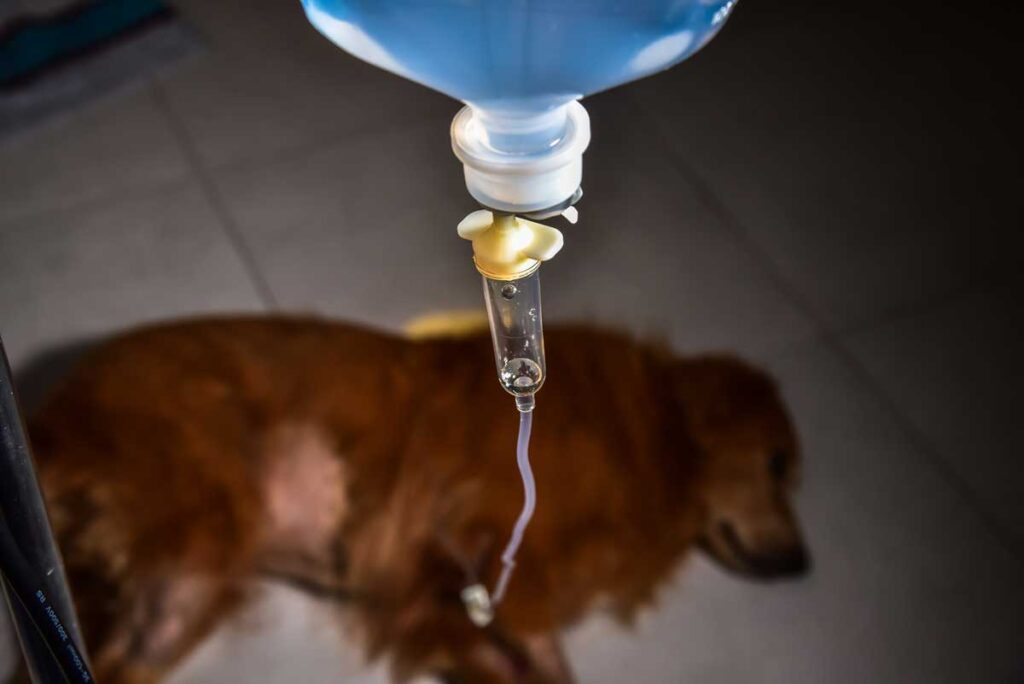How to Deal with Kidney Failure in Dogs

How to Deal with Kidney Failure in Dogs
Many people think that chronic kidney failure or chronic renal failure means that the kidneys have stopped working and are not making urine. Fortunately, this is not the case. By definition, chronic renal failure is the inability of the kidneys to efficiently filter the blood of its physiological waste products. At least 2/3 of the kidneys must be dysfunctional before any clinical signs are seen. Sadly, kidney failure can happen in dogs and, usually, this leads to the dog passing away. However, there are many treatments available to pet owners, at home and the vet hospital, to extend your dog’s life for as long as possible and give them the most comfortable and healthy environment possible. If you are worried that your dog may be displaying some dog kidney failure symptoms, worried about the cost of treating kidney failure in dogs or you are in search of a reliable and compassionate vet, call the team at Kirrawee Vet Hospital.
Causes of Canine Kidney Failure
So, what causes kidney failure in dogs? Anything that decreases blood flow through the kidney can cause kidney failure. This includes dehydration from things like severe vomiting and diarrhoea, heatstroke or other disorders causing massive damage to the body’s tissues, such as snakebites. Ordinary table foods like grapes and raisins, as well as certain commercial jerky treat products and aspirins can also cause kidney failure in dogs if ingested. Keep the dog away from grapes and snakes!
Signs & Symptoms of Canine Kidney Failure
Dog kidney failure symptoms include:
- Significant weight loss
- Vomiting
- Pale gums
- Drunken behaviour or uncoordinated movement such as stumbling
- Breath that smells like chemicals
- Significant decrease in appetite
- Increase or decrease in water consumption
- Increase or decrease in volume of urine
Treatments for Canine Kidney Failure
Treatments for kidney failure in dogs include things like:
- Significant weight loss
- Vomiting
- Pale gums
- Drunken behaviour or uncoordinated movement such as stumbling
- Breath that smells like chemicals
- Significant decrease in appetite
- Increase or decrease in water consumption
- Increase or decrease in volume of urine
It is important to research things like dog kidney failure diet changes and the required changes to your routine if your dog suffers from kidney problems. You may also be wondering ‘is kidney failure in dogs painful?’ and the positive answer is that it is uncomfortable for your dog rather than painful, so they can live with it if adapted properly.
Fluid Therapy Treatment at the Vet
The cost of treating kidney failure in dogs is a common concern, but things like fluid treatment on an IV is a popular and effective method of treatment and your local vet clinic will provide you with all the financial and pragmatic details. For a consultation and treatment plan, call Kirrawee Vet Hospital today.
Pet Care Tips Listing
- Things to Know About Pet Diabetes
- Things to Know About Dog and Cat Arthritis
- How to Prevent Your Dog from Biting: Child Safety Tips
- How to Keep Your Dog Mentally Active
- 5 Things to Ask at Your Pet’s First Vet Appointment
- How to Deal with Kidney Failure in Dogs
- What to Do If You See Wildlife on The Road
- 5 Things You Need Before Bringing a Kitten Home
- Fleas: Causes and Prevention for Dogs
- What to Look for in a New Vet?
- How to Stop Cats from Scratching Furniture
- Questions to Ask Your Vet About Your Senior Dog in NSW
- What is separation anxiety?
- 4 Mistakes to Avoid When Training Your Dog
- Choosing Teeth-Friendly Treats for Your Pets
- How to Prepare for Camping with Your Dog
- Maintaining Good Oral Hygiene in Your Pets
- How to Know if Your Dog Has Worms and What to Do
- How to Give Your Pet Medication
- 4 Signs Your Cat Should See a Vet
- Human Food Safety for Dogs: What Foods to Avoid
- Why You Need to Vaccinate Your Puppy Before You Walk It
- How to Potty Train Puppies
- Why Should You Vaccinate Your Cat?
- What Does It Mean If Your Puppy is Limping?
- Expert Dog Swimming Tips by Kirrawee Vet
- How Often Does Your Puppy Need a Bath?
- How to Keep Your Aging Dog Comfortable
- Common Preventable Diseases in Dogs
- Common Feline Musculoskeletal Disorders
- Why Should You Vaccinate Your Dog?
- Patellar Luxation in Dogs – Expert Care in NSW
- Musculoskeletal Disorders in Dogs
- Osteoarthritis in Dogs
- Causes and Treatment of Hip Dysplasia in Dogs
- Do Dogs Need Regular Dental Care?
- Breeds of Dogs That Need the Most Exercise?
- What to Feed Fluffy? Dry or Wet? Both?
